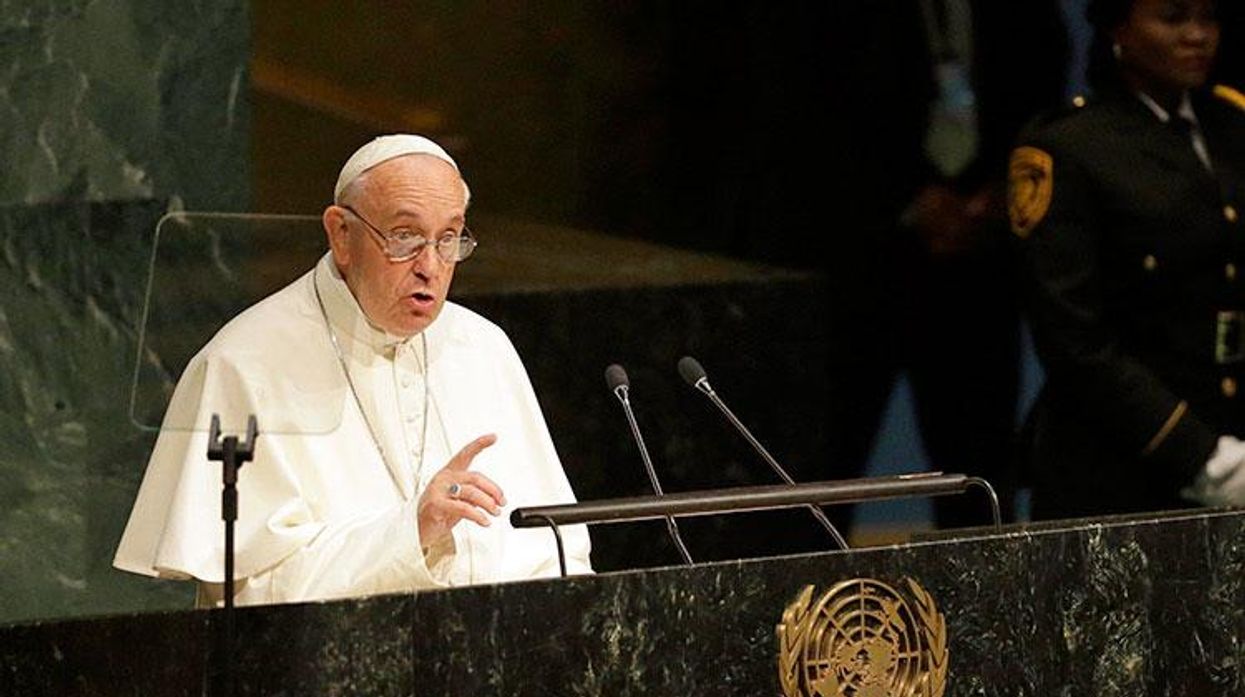One day after a historic address to the U.S. Congress where he spoke of his "concern for the family," presumably a veiled reference to marriage equality, Pope Francis once again alluded to LGBT people, this time in his speech at the United Nations Headquarters in New York.
Speaking to the global governing body this morning, Pope Francis once again discussed the family, calling it the "primary cell of any social development" and stressing the "primary right of the family to educate its children," including a focus on "religious freedom."
After a lengthy critique of official inaction to fight climate change and halt environmental destruction, the pope turned his attention to other ills he called a "misuse of creation." Such misuses, the pontiff said, compelled him to speak out in defense of "the moral law written into human nature itself," including "the natural difference between man and woman," according to Time's transcript of the pope's speech.
He continued:
"Creation is compromised 'where we ourselves have the final word... The misuse of creation begins when we no longer recognize any instance above ourselves, when we see nothing else but ourselves' (ID. Address to the Clergy of the Diocese of Bolzano-Bressanone, 6 August 2008, cited ibid.). Consequently, the defence of the environment and the fight against exclusion demand that we recognize a moral law written into human nature itself, one which includes the natural difference between man and woman (cf. Laudato Si', 155), and absolute respect for life in all its stages and dimensions (cf. ibid., 123, 136).
"Without the recognition of certain incontestable natural ethical limits and without the immediate implementation of those pillars of integral human development, the ideal of 'saving succeeding generations from the scourge of war' (Charter of the United Nations, Preamble), and 'promoting social progress and better standards of life in larger freedom' (ibid.), risks becoming an unattainable illusion, or, even worse, idle chatter which serves as a cover for all kinds of abuse and corruption, or for carrying out an ideological colonization by the imposition of anomalous models and lifestyles which are alien to people's identity and, in the end, irresponsible."
Although the pope did not directly mention LGBT people, the Vatican's stance toward gay, lesbian, bisexual, and especially transgender people is well-documented. While Francis has made several overtures to connect with gay and lesbian Catholics who feel rejected by a church that continues to deem their relationships inherently sinful, transgender people within the church have yet to find such respite. Francis did have a meeting with a Spanish transgender man who was rejected by his church, but skeptics stress that the pontiff has yet to call for changes to Catholic doctrine that denounces transgender identities.
The pope has condemned gender theory, and in June issued a sermon that expressed the belief that gender differences are key to successful marriages and parenting -- sending negative a message about LGBT parents and same-sex couples.
Earlier this year, the Pope Francis published an environmental encyclical that some trans advocates denounced as transphobic for its command to accept "our bodies as God's gift... whereas thinking we enjoy absolute power over our bodies turns, often subtly, into thinking that we enjoy absolute power over creation." That encyclical went on to call for "valuing one's own body in its femininity or masculinity," concluding that "it is not a healthy attitude which would seek to cancel out sexual differences."






























